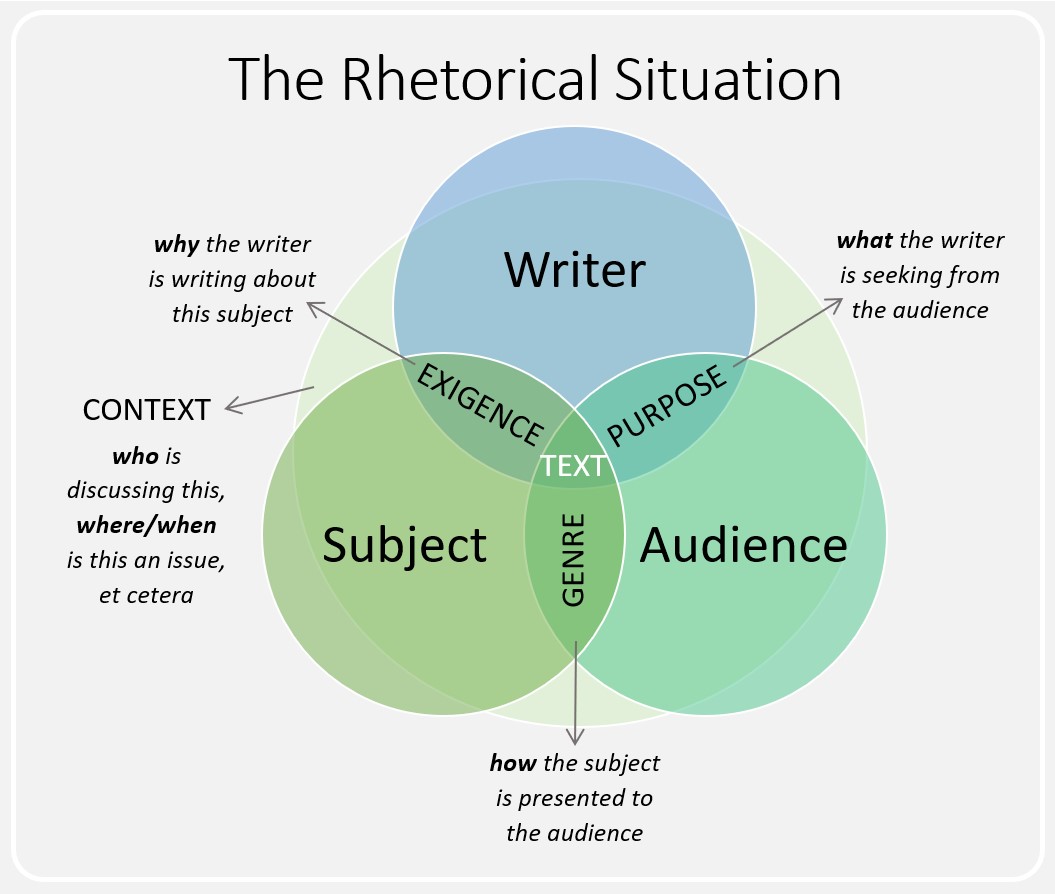The Rhetorical Situation
Justin Jory
PROFILE
The term “rhetorical situation” refers to the circumstances that bring texts into existence. The concept emphasizes that writing is a social activity, produced by people in particular situations for particular goals. It helps individuals understand that, because writing is highly situated and responds to specific human needs in a particular time and place, texts should be produced and interpreted with these needs and contexts in mind.
As a writer, thinking carefully about the situations in which you find yourself writing can lead you to produce more meaningful texts that are appropriate for the situation and responsive to others’ needs, values, and expectations. This is true whether writing a workplace e-mail or completing a college writing assignment.
As a reader, considering the rhetorical situation can help you develop a more detailed understanding of others and their texts.
In short, the rhetorical situation can help writers and readers think through and determine why texts exist, what they aim to do, and how they do it in particular situations.
ELEMENTS OF THE RHETORICAL SITUATION
Writer
The writer is the individual, group, or organization who authors a text. Every writer brings a frame of reference to the rhetorical situation that affects how and what they say about a subject. Their frame of reference is influenced by their experiences, values, and needs: race and ethnicity, gender and education, geography and institutional affiliations to name a few.
Audience
The audience includes the individuals the writer engages with the text. Most often there is an intended, or target, audience for the text. Audiences encounter and in some way use the text based on their own experiences, values, and needs that may or may not align with the writer’s.
Purpose
The purpose is what the writer and the text aim to do. To think rhetorically about purpose is to think both about what motivated writers to write and what the goals of their texts are. These goals may originate from a personal place, but they are shared when writers engage audiences through writing.
Exigence
The exigence refers to the perceived need for the text, an urgent imperfection a writer identifies and then responds to through writing. To think rhetorically about exigence is to think about what writers and texts respond to through writing.
Subject
The subject refers to the issue at hand, the major topics the writer, text, and audience address.
Context
The context refers to other direct and indirect social, cultural, geographic, political, and institutional factors that likely influence the writer, text, and audience in a particular situation.
Genre
The genre refers to the type of text the writer produces. Some texts are more appropriate than others in a given situation, and a writer’s successful use of genre depends on how well they meet, and sometimes challenge, the genre conventions.
A VISUAL MODEL OF THE RHETORICAL SITUATION

ADDITIONAL RESOURCES ON THE RHETORICAL SITUATION
- “The Rhetorical Situation: Writing Doesn’t Exist in a Vacuum”—video published by the Student Writing Center at the University of Maryland-Baltimore
- “The Rhetorical Situation”—entry published on Wikipedia.com

